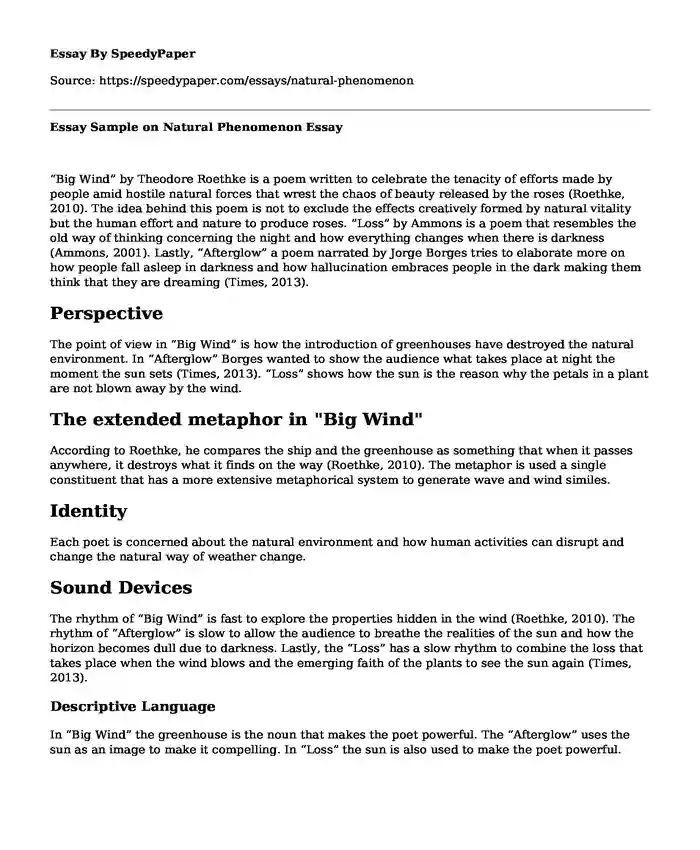“Big Wind” by Theodore Roethke is a poem written to celebrate the tenacity of efforts made by people amid hostile natural forces that wrest the chaos of beauty released by the roses (Roethke, 2010). The idea behind this poem is not to exclude the effects creatively formed by natural vitality but the human effort and nature to produce roses. ”Loss” by Ammons is a poem that resembles the old way of thinking concerning the night and how everything changes when there is darkness (Ammons, 2001). Lastly, “Afterglow” a poem narrated by Jorge Borges tries to elaborate more on how people fall asleep in darkness and how hallucination embraces people in the dark making them think that they are dreaming (Times, 2013).
Perspective
The point of view in “Big Wind” is how the introduction of greenhouses have destroyed the natural environment. In “Afterglow” Borges wanted to show the audience what takes place at night the moment the sun sets (Times, 2013). “Loss” shows how the sun is the reason why the petals in a plant are not blown away by the wind.
The extended metaphor in "Big Wind"
According to Roethke, he compares the ship and the greenhouse as something that when it passes anywhere, it destroys what it finds on the way (Roethke, 2010). The metaphor is used a single constituent that has a more extensive metaphorical system to generate wave and wind similes.
Identity
Each poet is concerned about the natural environment and how human activities can disrupt and change the natural way of weather change.
Sound Devices
The rhythm of “Big Wind” is fast to explore the properties hidden in the wind (Roethke, 2010). The rhythm of “Afterglow” is slow to allow the audience to breathe the realities of the sun and how the horizon becomes dull due to darkness. Lastly, the “Loss” has a slow rhythm to combine the loss that takes place when the wind blows and the emerging faith of the plants to see the sun again (Times, 2013).
Descriptive Language
In “Big Wind” the greenhouse is the noun that makes the poet powerful. The “Afterglow” uses the sun as an image to make it compelling. In “Loss” the sun is also used to make the poet powerful.
Sensory Language
Sensory images that give the sense of light in the three poems include:
“Big Wind” – “We stayed all night.” This gives the idea of someone staying in darkness.
“Afterglow” – “When on the horizon, nothing is left” (Times, 2013). The phrase shows that when the sun sets, nothing is visible
“Loss” – “In diffuse evening shades.” The phrase shows the shadow of the plant while the sun is setting
Sensory images that give the sense of hearing in the three poems include:
“Big Wind” – “As the seams hissed” (Roethke, 2010). The phrase makes the audience curious to hear the sound.
“Afterglow” – “The clamour and pomp of the setting sun” (Times, 2013). The stanza makes the audience to be eager that there may be sound during this event
“Loss” – “Anyway, the wind does” (Ammons, 2001). When the wind is blowing sound is created.
Did the poems use nature to parallel life?
All poems use nature to elaborate more on how things take place in the environment. The idea of using imagery was practical to invite the audience to the poet.
References
Ammons, A. R. (2001). Collected poems, 1951-1971. Retrieved from https://www.amazon.com/Collected-Poems-1951-1971-R-Ammons/dp/0393321924
Roethke, T. (2010, March 30). Big wind. https://www.poemhunter.com/poem/big-wind/
Times, T. P. N. (2013, August 25). Jorge Luis Borges. Afterglow – English version. Retrieved from https://thepassengertimes.com/2012/01/31/jorge-luis-borges-afterglow-english-version/
Cite this page
Essay Sample on Natural Phenomenon. (2023, Aug 10). Retrieved from https://speedypaper.com/essays/natural-phenomenon
Request Removal
If you are the original author of this essay and no longer wish to have it published on the SpeedyPaper website, please click below to request its removal:
- Essay Sample Dedicated to Johann Sebastian Bach
- Free Essay Sample on Hypothesis Testing Review
- Reflection Paper Example on a Life Event in My Family Using the Systems Theory
- Essay Sample: Glenn Gould the Pianist
- Essay Sample on Men's Desire for Freedom
- Essay Sample on Action Plan and Implementation Strategy
- Paper Example: The Mortality Transition in Western Culture
Popular categories





